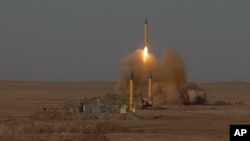CAIRO — Iran's defense minister, Ahmad Vahidi, says that Tehran has tested a new version of its Fateh 110 short-range missile. He claims the newer missile can hit "enemy" targets in neighboring countries, and targets at sea in the Persian Gulf. Lebanon's Hezbollah reportedly has stockpiles of an earlier version of the missile.
The reported test of the Iranian short-range missile with a new guidance system was announced on government TV Saturday, accompanied by video of rockets being launched. It was impossible to verify if the rocket launch video is recent or from archives.
Iranian Defense Minister Ahmad Vahidi described the upgraded missiles at a press conference, lauding his country's technological prowess:
He stresses that the specificity of this missile is its ability to hit targets with precision. He also praises Iran's talented scientists and home-grown defense industry.
Iran's Fars News Agency reported that the new version of the Fateh 110 missile has a range of about 300 kilometers and can carry a 250 kilogram warhead. The short-range surface-to-surface Fateh missile uses solid fuel and has an improved guidance system to increase accuracy.
Defense Minister Vahidi said that the fourth-generation missile was designed to “target and destroy land and sea targets, enemy command and control centers, as well as missile launch pads, weapons depots, radar bases etc.”
The Israeli press reported that Lebanon's Hezbollah militant group possesses a large stockpile of an earlier version of the Fateh 110 missile.
Analyst Alex Vatanka of the Middle East Institute notes that the upgraded short-range missile, along with a host of other recent Iranian military developments, is intended to dissuade potential enemies from attacking:
"These military-related steps, war games, launching of new missiles, are meant to act as a deterrent, both against the United States and the West in general, but also towards Iran's immediate Arab neighbors," he said.
Vatanka argues that Iran's Supreme Leader, Ayatollah Ali Khamenei, does not appear to take the prospect of an outside attack on his country seriously, nor is he extremely worried about the prospect of new sanctions. “The [ongoing] process of brinkmanship,” he says, “[prompts] Iran to flex its military muscle on a periodic basis, and I'm sure it will continue.”
The West suspects Iran wants to build nuclear weapons although Iran says its nuclear program is for peaceful purposes only. However Iranian officials have in the past threatened to wipe Israel off the face of the earth.
The former head of Israel's Mossad spy agency told the New York Times several days ago that if he were Iranian, he “would be fearful of the next 12 weeks,” alluding to a possible attack on Tehran's nuclear facilities.
The reported test of the Iranian short-range missile with a new guidance system was announced on government TV Saturday, accompanied by video of rockets being launched. It was impossible to verify if the rocket launch video is recent or from archives.
Iranian Defense Minister Ahmad Vahidi described the upgraded missiles at a press conference, lauding his country's technological prowess:
He stresses that the specificity of this missile is its ability to hit targets with precision. He also praises Iran's talented scientists and home-grown defense industry.
Iran's Fars News Agency reported that the new version of the Fateh 110 missile has a range of about 300 kilometers and can carry a 250 kilogram warhead. The short-range surface-to-surface Fateh missile uses solid fuel and has an improved guidance system to increase accuracy.
Defense Minister Vahidi said that the fourth-generation missile was designed to “target and destroy land and sea targets, enemy command and control centers, as well as missile launch pads, weapons depots, radar bases etc.”
The Israeli press reported that Lebanon's Hezbollah militant group possesses a large stockpile of an earlier version of the Fateh 110 missile.
Analyst Alex Vatanka of the Middle East Institute notes that the upgraded short-range missile, along with a host of other recent Iranian military developments, is intended to dissuade potential enemies from attacking:
"These military-related steps, war games, launching of new missiles, are meant to act as a deterrent, both against the United States and the West in general, but also towards Iran's immediate Arab neighbors," he said.
Vatanka argues that Iran's Supreme Leader, Ayatollah Ali Khamenei, does not appear to take the prospect of an outside attack on his country seriously, nor is he extremely worried about the prospect of new sanctions. “The [ongoing] process of brinkmanship,” he says, “[prompts] Iran to flex its military muscle on a periodic basis, and I'm sure it will continue.”
The West suspects Iran wants to build nuclear weapons although Iran says its nuclear program is for peaceful purposes only. However Iranian officials have in the past threatened to wipe Israel off the face of the earth.
The former head of Israel's Mossad spy agency told the New York Times several days ago that if he were Iranian, he “would be fearful of the next 12 weeks,” alluding to a possible attack on Tehran's nuclear facilities.




